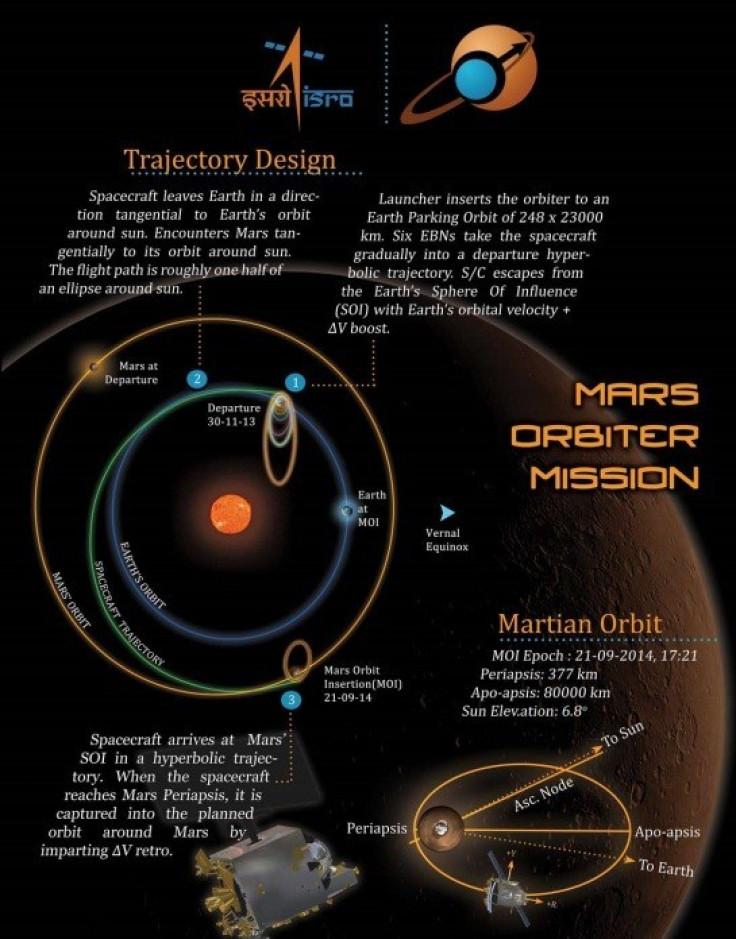India's Mars Mission: Poverty, Development, China and Geopolitical Interests [VIDEO]

As India's ambitious Mars Mission got under way, the economic and geopolitical strategies behind the mission are being hotly debated.
Fending off criticism over the high cost of the project, K Radhakrishnan, Chairman of Indian Space Research Organization (ISRO), said the "trickle down" effects from advanced space capabilities would be enormous. He countered concerns over the relatively massive investment in abstract space programme in the midst of poverty by saying that achievements in space research will result in wide-ranging benefits.
India's space programme spends $1.1bn annually, while the Mars mission alone would take up $74m. Critics say there are about 350 million people in the country who live on less than $2 a day.
None other than a former Chief of ISRO, G Madhavan Nair, came down heavily on the Mars mission, saying it was a futile exercise for publicity.
"ISRO is embarking on an extravagant mission which at best can serve as a publicity stunt," he had said in July.
Spending on Development
In fiscal year 2012-13, India's budgetary allocation to the Ministry of Rural Development alone was about $15bn, according to the Accountability Initiative, a research organisation under the Centre for Policy Research, New Delhi. This makes the money spent on the Mars mission and the annual spending on space programme to be 0.5% and 7.3%, respectively, of the amount spent on rural development alone.
Similarly, the money India spends annually on education is about $12bn, according to a study conducted by IDFC.
Indian Prime Minister Manmohan Singh dismissed criticism saying: "Questions are sometimes asked about whether a poor country like India can afford a space programme and whether the funds spent, albeit modest, could be better utilised elsewhere," he said in a speech last year. "This misses the point that a nation's state of development is finally a product of its technological powers."
The space research organisation has highlighted the broader benefits of previous space programmes. "Previous satellite launches helped build more than 100,000 wells," said S Satish, a spokesman for ISRO.
In October, when cyclone Phailin headed for the south-eastern and eastern states, India could track it precisely, and one million people were evacuated at the right time. The investment made in satellite programmes over the years made the difference, said Mayank N Vahia, an academic at the Department of Astronomy and Astrophysics at the Tata Institute of Fundamental Research in Mumbai, according to Businessweek.
India's space programme has brought mobile phone access even to the interiors of country, which revolutionised the channels available for farmers to sell their produce and for fishermen in isolated villages to get the best prices for their catch.
India and China
There is a view that India's Mars mission is in response to China's recent forays into space. "There is an ongoing race for space-related power and prestige currently in Asia," James Moltz, a professor at Naval Postgraduate School, California, was quoted by Bloomberg as saying. "India is clearly concerned about China's recent rise in space prestige and wants to minimise that damage."
Jan Zalewski, South Asia analyst at Control Risks would agree. "India's space programme is ultimately intended as a capability demonstration. It is designed to put India 'out there' with other space-faring nations, and this is reflective of Indian ambitions to increase its international profile more generally," Zalewski said, according to CNBC.
"To think that India is going to the moon and Mars because of some cynical ploy to engage in one-upmanship with the Chinese is wrong," said John Sheldon, a US national security analyst and founder of strategy firm The Torridon Group. "For every rupee invested, there is a return for regular Indian people in terms of what that programme provides," he told the Washington Post.
The same sentiment is echoed by ISRO Chairman Radhakrishnan."Space is one area right from the beginning that has been contributing to the development process of the country," he said, referring to the beneficial contribution of weather forecasting on farmers of the country, according to AFP.
However, India does appear to be conscious of its neighbours and the strategic implications of being ahead in space technology. "India doesn't live in a benign neighbourhood," said Rajeshwari Rajagopalan, a space security expert at the Observer Research Foundation, New Delhi, according to the Wall Street Journal. According to her, India is focused on peaceful use of outer space, but since China successfully tested an anti-satellite missile in 2007, there has been a "sort of arms race".
In August this year, India successfully launched its first dedicated military satellite for naval intelligence gathering in the backdrop of concerns about Chinese naval presence in the Indian Ocean.
"India's achievements in space technology are contributing to its missile technology, including the Agni-V," says Upendra Choudhury, an associate professor at Aligarh Muslim University and an expert on India's ballistic missile programme, AFP reported.
© Copyright IBTimes 2024. All rights reserved.





